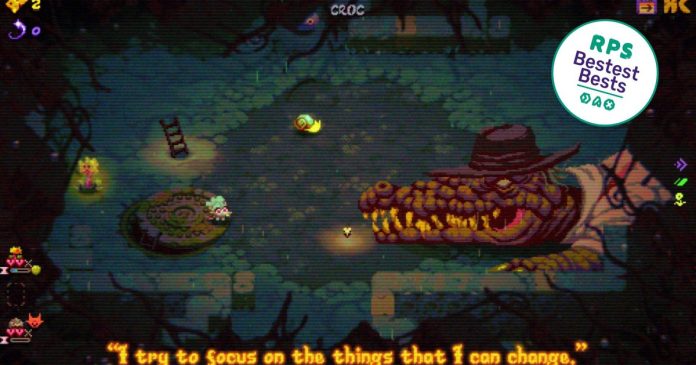The word “morsel” comes from the Latin “mordeo”, meaning “I bite”. Every time you play Morsels, you are bitten and eaten by a horrible cat. The beast’s incisors crash shut around the screen, and you tumble slowly down its oesophagus after the game’s squealing mouse protagonist.
I could write a whole article about the bastardly antics of cats – there’s one living next door who’s at that stage of feline youth when she really, really enjoys playing with her food. But the first time I succumbed to those jaws, I thought instead of the plughole in my bathroom sink, a trivial hellmouth full of hair and toothpaste. I thought, too, of the tenacious little flies that keep emerging from that soap-scummed porcelain sphincter, the life that keeps surfacing from a conduit of my filth.
The cat’s throat in Morsels is a cosmic drain that runs from the heavens to the sewers, its squamous folds furred by invading tree roots. Your task, as the mouse, is to fight your way back up through a dozen or so levels of teeming and beautiful roguelike disorder, enlisting up to three, hot-swappable creatures of weaponised waste to battle all the squirming, indigestible things you encounter along the way.
I felt a weird shame, playing Morsels for the first time. I tried a few runs and looked around my flat at all the yellowing curls of fingernail and bits of tracked-in leafmold, the rags of spiderweb clinging to still-packed and wilting boxes from the move a whole year and a half ago. I went into the kitchen and looked at the binbags torn by aluminium cans, leaking rivulets of coffee. The council don’t collect recycling, and the nearest depot is two miles away on foot – still, I know I could take my cans there if I cared to.
While Morsels is not a “political” game in the sense of being didactic, it is made up of bite-sized reminders of such human carelessness. One of the first “Morsels” you’ll acquire is Gumsel, a Hubba Bubba hooligan who works well as a turtling ranged attacker, its special move producing bubbles that block or slow enemies. Real-world chewing gum is comparably resilient, made up of non-biogradeable petrochemical products that are capable of outlasting the mortar of the buildings and pavements we absent-mindedly stick it to.
Cigarette butts also take a while to decompose, but Morsels focuses on the more immediate cost of chucking them aside. Later in the game, you’ll meet Zigsel, a Rizla caterpillar that is always at risk of being incinerated by its own trail of embers. And then there’s Smugsel, a burly tuft of exhaust fumes that refuses to blow away.
The boss design burps a few notes of more overt and specific satire. There’s a cat in a square suit with a Trumpian combover who transforms into a lolloping cheeseburger (each boss has alternate transformations, encountered on replay). Between levels, you’ll bump into a rotating cast of Lynchian gargoyles who’ll generally offer some rewards or a minigame, and sometimes, take things away. These gatekeepers include a beached sperm whale, flat on its back with a sixpack tab braceleting one fin, and a group of Goyalike children watching news footage of a falling bomb. Still, Morsels isn’t out to be a game with a Message; it’s too engrossed in its own mess.
Which doesn’t make it unfeeling, or lacking in radical sentiment. Morsels follows our waste down into muculent canyons of worms pushing through background surfaces like intrusive thoughts, but there is no weeping in the sewers. There is a choreic and maternal fatberg who sends you off on each run with a hug, belching a heart emoji into the sewer pipe above. There is a busker made of sopping weed and trumpets, burbling away by the ladder to the first area. There is a raccoon tapping their feet to the busker’s music, and another, sleeping raccoon who farts obligingly when struck. There is a strange love here, radiating through the grease as though from some fermenting magma pocket. Love and silliness and good-natured malice.
The scurrying things in the realms above will kill you endlessly, sending the mouse’s body back down the catpipe to the bowel, but you and they are matter that can only be remade, not destroyed, and there is a kind of embrace in each failure, like being warmly enveloped by the mud of a polluted estuary when the tide pulls out. The procedural level generation is deathly, but it loves you. It dances for you. It throws ingenious shapes for you, cosy CRT-fugged labyrinths of maybe six to a dozen ‘rooms’ and corridors apiece, comprised of padlocked walls, big-lipped turrets, sweeping chainsaws, canalina dentata, and flaming chum. The individual critters are delightful, both for their visceral personality and for the crafty way they choreograph what is on some level a bullet hell game.
There are the Bubs, grousing lipomas that wiggle through the pores of each map: barely a threat in themselves, they are often lethal when you fail to notice them in amongst salvos of toxic sputum. There are the goddamn inextinguishable fairies introduced by one level modifier, who flit through walls and glance away from your attacks like wily blue bottles.
There is the roaring spectral adder that serves the same purpose here as Spelunky‘s ghost, slithering in from the outskirts of the playspace after an unpredictable time, blocking routes with its coils as you hurry to scoop up stars for level-ups and cheesecrumbs to spend on power-ups. There is the slumbering bus – a porcine, centipedal variation on the evening circular from My Neighbour Totoro – who’ll whisk you direct to the next biome, providing you acquire a ticket, and providing you’re happy to play a little Frogger on the way.
The friendliest of all are the birds. These include pigeons, those hardy, sociable beings we Londoners call “rats with wings” (and yes, there are rats in Morsels as well, all of them sporting sunshades) – you’ll find them hummocked on bricks, watching the chaos of each fight as impassively as they would commuters on a station platform. You’ll also find birdcages you can smash to acquire an escort of auto-firing sparrows, a boon indeed when you’re trying to figure out a more challenging and indirect species of Morsel. The ones I struggle with the most include Hogsel, a cousin of arcade Snake that guzzles its own tail unless you keep feeding it, and Uggsell, a cracked egg with overdeveloped thighs, who “tele-hatches” to a kicked ball in a blast of black yolk.
The variations of Morsel make a point about language, I think, which goes beyond their brief and bemusing bestiary descriptions. “Mordeo” is cognate – that is, it shares an ancestor – with the English word “smart”, which can refer to cleverness and good looks and also, to pain. That contrast captures the ugliness of ‘beautiful’ language, its grammar and vocabulary partly the result of accident and appropriations, of misunderstanding and the workings of power. It accumulates into bad habits like oil in a plughole.
My own vocabulary is a crusted well of privilege, a goblet of pricey adjectives and curdled, mannered phrases like “relatively innocuous” or “sumptuous” or “conjured”, to pick a few that keep stabbing me in the eyes whenever I re-read anything I’ve written on here. In squeezing a menagerie from compound puns, Morsels goads you to get your teeth into the rubble, to chew and reform language with your tongue. What other species of -sel can you think of? Many more than the couple of dozen on show in this game.
It’s tempting to summarise the levels as “ecologies” – another favourite of mine, when describing any simulation – but when I spoke to him at this year’s Summer Games Fest, developer Toby Dixon resisted the term. Morsels doesn’t have an ecology in the sense of a more calculated and graded representation of multilateral relationships between autonomous creatures. The creatures in Morsels don’t relate, as such; they’re only interested in you. Complexity and tactical advantage arise, however, when they get in each other’s way.
You bump into the tiny peaceful snails that fill every level, and they roll over a smoking grill, catch fire and collide with fanged spaghetti monsters that look like decapitated Sweetums. Demon skulls orbiting your character are glued to balls of snot; rodent snipers are clobbered by spiked chains sent swinging by your hasty retreat. All this on top of the curious and competing effects of modifiers, like passives that set off your Morsel’s special move when they’re damaged, or throw cleansing blue water in the direction of your dodge.
These interactions may be accidental, but they feel alive. I thought that was me projecting, but then I remembered the argument that complex life begins with things bouncing off each other – the Epicurean clinamen, whereby plummeting atoms swerve into cascades that, given enough time, add up into a world, rather than just a steady fall of unintegrated matter.
Matter! Morsels simply adores the stuff, adores what happens when you glop enough of it together. One precedent is Mad God, the stop motion magnum opus of Phil Tippett, animator of robots and dinosaurs for Lucas and Spielberg. Mad God is one of the most appalling things you’ll ever watch, and also one of the most wonderful. It is a Miltonic depth of shit and torture and sleepless, atrocious fecundity. Like Morsels, it sort of germinates from trash-compacted materialism and kleptomania. “A lot of the time I had no idea what I was doing, working with a lot of chemicals and dyes where I was pouring one into the other,” Tippett told Variety in an interview, adding that “I’m an obsessive collector of not anything worthwhile, just stuff. This film is like I invited stuff into this gravitational field that eventually condenses into something.”
Mad God takes place in “a memory or a ghost world of mankind,” Tippet went on. “It’s what our consciousness was left with after we left.” The same could be said of Morsels, in which human vestiges are everywhere, but humans themselves are displaced into zoomorphic caricature. These vestiges extend from the literal bodily runoff that forms the menagerie to Dixon’s congealed memories of bygone aesthetics, old playthings and videogames recast as minigames hidden in mouse holes, or slid between levels. Snakes & Ladders, Frogger, table hockey, pinball – the spoiling fruits of an 80s and 90s childhood fished triumphantly from the dumpster, reassembled with intimacy and panache in the face of the parallel soulless perversions of re-generative AI.
The overall structure of the game is comparable to the very first Toejam & Earl, while its pacey and concussed, off-kilter soundtrack riffs on the likes of Hey Arnold, but it doesn’t aim to be the sum of its referencing. It makes me think of Tippett, again: “the nomenclature of the day is content, content, content, and it’s more like hot air, hot air, hot air,” he told Variety. “I wanted to make something that grabs people’s attention and takes you some place where you had never been before, and you have no idea where it’s going.”
Morsels corresponds to certain well-oiled mantras of content, content, content. It’s an ultra-replayable game with some perma-progression to ease the sting of rapidly repeated defeat. The tempo of increasing difficulty is broadly recognisable, as are the ways you can enhance each Morsel to, for example, slow time on damage, or inflict more criticals. Later biomes screw with you in familiar ways: heaven is a cloudscape with many whirring desk fans, and no guard rails.
You could probably reduce Morsels to the status of a well-made genre piece, a reverse Spelunky with a streak of Noita, but there’s a pervasive uncertainty – I’m still not sure what those Goyalike children are for, after seven hours of play – and the sturdiness of the rogueliking isn’t what makes this compelling. What makes it compelling is the story it tells about the roguelike, about generators and their supporting databases, here reinvented as treacherously fermenting landfill. This is the roguelike gone rancid in a time where roguelikes are as common as pigeons, stewed in the juices of overmuch creation.






